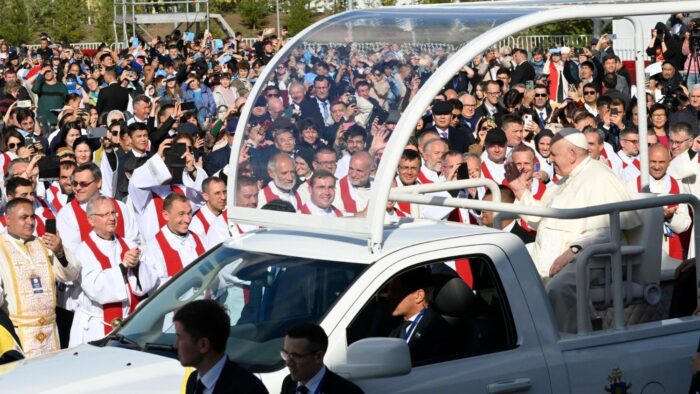Pope Francis remembers his 38th Apostolic Journey abroad to the Central Asian nation of Kazakhstan as a ‘pilgrim of peace’ during this moment of war, and makes a strong appeal against nuclear weapons. The Holy Father also prays that the resolutions of interfaith leaders gathered at the Congress in Nur-Sultan can have concrete consequences.
Pope Francis has remembered Kazakhstan’s martyrs who had been persecuted under the former communist regime, and while recalling the country south of Russia’s rejection of nuclear weapons – made a vehement appeal against their use.
He did so during his Wednesday General Audience in St. Peter’s Square, dedicating this week’s catechesis to his recently-concluded Apostolic Journey to Kazakhstan, for the occasion of the seventh Congress of Leaders of World and Traditional Religions.
During his catechesis, the Pope recalled his ‘pilgrimage of peace’ to the Central Asian country, dedicated to interreligious dialogue, unity and peace, especially as the world is enveloped by war.
The fruits of faith

Pope Francis and President Tokayev. Photo credit: President’s press service
The Pope remembered the Church in the country, saying he was “so glad to meet a community of happy, joyful people filled with enthusiasm.”
“Catholics are few in that vast country. But this condition, if lived with faith, can bring evangelical fruits: first of all, the blessedness of littleness, of being leaven, salt, and light relying solely on the Lord and not on some form of human relevance.”
Catholics make up a mere 1 percent of Kazakhstan’s population, which is 70 percent Muslim and 25 percent Christian, primarily Russian Orthodox.
The Pope noted that the Catholics’ numerical scarcity “invites the development of relationships” with Christians of other denominations, and also of fraternity with all religions.
“So a small flock, yes,” he said, “but open, not closed, not defensive, open and trusting in the action of the Holy Spirit, who blows freely where and how He wills.”
Martyrs of the faith

Pope Francis arriving for the Holy Mass. Photo credit: vaticannews.va.
“We remembered the martyrs of that holy People of God, men and women who suffered so much for the faith during the long period of persecution.”
The Pope reflected on the Eucharistic Celebration for this small but joyful flock on the Expo 2017 grounds in the Kazakh futuristic capital of Nur-Sultan, noting how apropos it had been to fall on the Feast of the Exultation of the Holy Cross.
The Cross of Christ, our anchor and never-disappointing hope
“In a world in which progress and regression are intertwined,” he said, “the Cross of Christ remains the anchor of salvation: a sign of hope that does not disappoint because it is founded on the love of God, merciful and faithful.”
The Pope renewed his gratitude to the President of the Republic and the other authorities of Kazakhstan for the cordial welcome they had given him.
“I also sincerely thank the bishops and all the collaborators for the great work they have done, and especially for the joy they have given me in being able to meet and see them all together.”
Building a world of respecting each other
The Pope praised the initiative of the Congress of Leaders of World and Traditional Religions.
“This initiative has been carried out for 20 years by the authorities of the country, which presents itself to the world as a place of meeting and dialogue, in this case at the religious level, and thus as a leading player in promoting peace and human brotherhood.”
Pope Francis lauded its commitment to put religions at the center of efforts “to build a world where we listen to each other and respect each other in diversity.”
Credit must be given
The Pontiff remembered the Congress’ Final Declaration, which stands in continuity with the Document signed in Abu Dhabi in February 2019 on human fraternity.
“I like to interpret this step forward as the fruit of a journey that starts from afar: I am thinking, of course, of the historic Interfaith Meeting for Peace convened by St. John Paul II in Assisi in 1986; I am thinking of the far-sighted gaze of St. John XXIII and St. Paul VI; and also that of great souls of other religions – I limit myself to recalling Mahatma Gandhi.”
Remembering the many martyrs
“But how can we not remember so many martyrs, men and women of all ages, languages and nations, who paid with their lives for their fidelity to the God of peace and fraternity? We know: solemn moments are important, but then it is the daily commitment, it is the concrete witness that builds a better world for all.”
In addition to the Congress, this trip, he said, gave him the opportunity to meet the authorities of Kazakhstan and the Church living there.
“I emphasized Kazakhstan’s vocation to be a country of encounter: in fact, about one hundred and fifty ethnic groups coexist there and more than eighty languages are spoken. This vocation, which is due to its geographical characteristics and history, has been welcomed and embraced as a path, which deserves to be encouraged and supported.”
“I hoped as well that the construction of an increasingly mature democracy, capable of effectively responding to the needs of society as a whole, could continue.”
Kazakhstan’s best practices and example – a ‘no’ to nuclear weapons
This, the Pope said, is an arduous task, which takes time.
“But already it must be acknowledged that Kazakhstan has made very positive choices, such as saying “no” to nuclear weapons and making good energy and environmental policies.”
Pope Francis concluded by thanking God for the Apostolic Journey, praying for its fruits, and for the life of the pilgrim Church in the country.
Special greetings to Venerable English College
During his remarks to English-speaking pilgrims, Pope Francis gave a special greeting to the new seminarians of the Venerable English College as they begin their priestly formation in Rome, and invoked upon them and their families joy and peace in the Lord.
